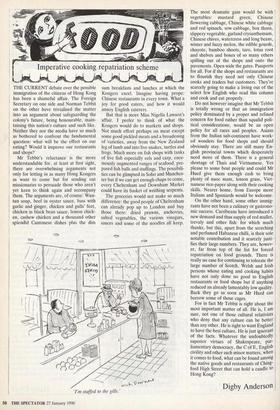Imperative cooking repatriation scheme
THE CURRENT debate over the possible immigration of the citizens of Hong Kong has been a shameful affair. The Foreign Secretary on one side and Norman Tebbit on the other have trivialised the matter into an argument about safeguarding the colony's future, being honourable, main- taining this nation's culture and such like. Neither they nor the media have so much as bothered to confront the fundamental question: what will be the effect on our eating? Would it improve our restaurants and shops?
Mr Tebbit's reluctance is the more understandable for, at least at first sight, there are overwhelming arguments not only for letting in as many Hong Kongers as want to come but for sending out missionaries to persuade those who aren't yet keen to think again and accompany them. The arguments are, of course: Wun- tun soup, beef in oyster sauce, bass with garlic and ginger, chicken and gulls' feet, chicken in black bean sauce, lemon chick- en, cashew chicken and a thousand other splendid Cantonese dishes plus the dim sum breakfasts and lunches at which the Kongers excel. Imagine having prope: Chinese restaurants in every town. What a joy for good eaters, and how it would annoy English caterers.
But that is more Miss Nigella Lawson's affair. I prefer to think of what the Kongers would do to markets and shops. Not much effort perhaps on meat except some good pickled meats and a broadening of varieties, away from the New Zealand leg of lamb and into live snakes, turtles and frogs. Much more on fish shops with tanks of live fish especially eels and carp, enor- mously augmented ranges of seafood, pre- pared fish balls and stuffings. The possibili- ties can be glimpsed in Soho and Manches- ter but if we can get enough chaps to come, every Cheltenham and Downham Market could have its basket of writhing serpents.
The groceries would not make so much difference: the good people of Cheltenham can already pop up to London and buy those there: dried prawns, anchovies, salted vegetables, the various vinegars, sauces and some of the noodles all keep.
'I'm stuffed to the gills.' The most dramatic gain would be with vegetables: mustard green, Chinese flowering cabbage, Chinese white cabbage and red spinach, sow cabbage, box thorn, slippery vegetable, garland crysanthemum, Chinese chives, watercress and long beans, winter and fuzzy melon, the edible gourds, chayote, bamboo shoots, taro, lotus root and shelves and boxes of so many others spilling out of the shops and onto the pavements. Open wide the gates. Passports for all. For if the shops and restaurants are to flourish they need not only Chinese cooks and traders but customers. They're scarcely going to make a living out of the select few English who read this column and cook and eat properly.
Do not however imagine that Mr Tebbit is totally wrong or that an immigration policy dominated by a proper and refined concern for food rather than squalid poli- tical considerations, would be an open policy for all races and peoples. Asians from the Indian sub-continent have work- ed wonders for food shops and should obviously stay. There are still many En- glish provincial towns which desperately need more of them. There is a general shortage of Thais and Vietnamese. Yes please to some boat people and could Mr Hurd give them enough cash to bring plenty of nuoc mam, lemon grass, Viet- namese rice-paper along with their cooking skills. Nearer home, from Europe more Italians and Spaniards would be welcome.
On the other hand, some other immig- rants have not been a culinary or gastrono- mic success. Carribeans have introduced a new demand and thus supply of red mullet, trevaly and other fish: for which much thanks, but this, apart from the scorching and perfumed Habanese chilli, is their sole notable contribution and it scarcely justi- fies their large numbers. They are, howev- er, far from top of the list for forced repatriation on food grounds. There is really no case for continuing to tolerate the large number of Scotch, Welsh and Irish persons whose eating and cooking habits have not only done no good to English restaurants or food shops but if anything reduced an already lamentably low quality. Back they go as soon as Mr Hurd can borrow some of those cages.
For in fact. Mr Tebbit is right about the most important matter of all. He is, I am sure, not one of those cultural relativists who deny that any culture can be better than any other. He is right to want England to have the best culture. He is just ignorant of the facts. Whatever the undoubtedly superior virtues of Shakespeare, par- liamentary democracy, the C of E, English civility and other such minor matters, when it comes to food, what can be found among the native goods and restaurants of Ching- ford High Street that can hold a candle to Hong Kong?
Digby Anderson


























































 Previous page
Previous page